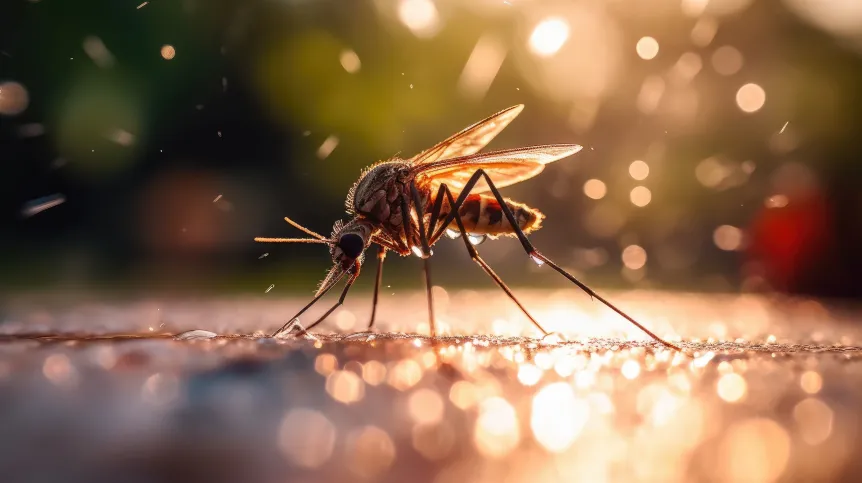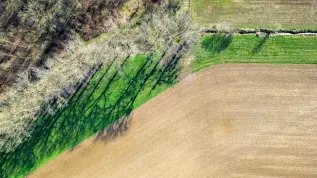
To cure the problem of mosquitoes and ticks, we should increase the population of mosquito-eating organisms, says entomologist Dr. Stanisław Czachorowski.
A professor at the University of Warmia and Mazury, hydrobiologist and ecologist, Czachorowski. Says that particularly in the case of ticks that spread Lyme disease and other dangerous diseases, the problem is serious, but poisonous spraying cannot be the only solution. It is not selective and kills many other organisms.
'Of course, it depends on the spray, but most often these are insecticides that kill not only mosquitoes and ticks. By doing that, we are destroying biodiversity. In addition, we ourselves are also exposed to these agents. We should look for more sophisticated ways to protect ourselves from the diseases spread by these blood-sucking species,’ he says.
For some time many scientific teams have been working intensively on methods to effectively combat the problem of ticks. It would be best to 'cure' them of the bacteria they spread so that they do not pose a threat to humans and other mammals. 'Also at the University of Warmia and Mazury, research is being conducted on making ticks immune to Lyme infection. The idea is for their body to fight the bacteria on its own and not spread it further. Perhaps this will be the best way,’ Czachorowski says.
The second group of animals that are often exterminated due to their being a nuisance to humans are mosquitoes. The problem with them may intensify in the coming years, because with the warming climate, mosquitoes carrying dangerous diseases such as dengue or malaria may reach us.
'With warming, we can expect completely new or forgotten epidemiological threats in our area,’ says Czachorowski.
He adds: ’But poisoning will not solve this problem. This effect is short-lived and only symptomatic. If someone has a heart attack, resuscitation is necessary, but it does not cure the heart, it only keeps the patient alive. It's the same with mosquito sprays.’
According to Dr. Czachorowski, the problem should be solved in a different way, for example by increasing the number of mosquito-eating organisms. 'We can invest in nest boxes for swifts, create appropriate conditions for bats. The point is that the ecosystem should have a lot of predators - both vertebrates and invertebrates - that feed on mosquitoes. Such ecosystem balancing is of course much more difficult and time-consuming than chemical spraying, but in the end it will be much more beneficial for us. This, in turn, can be compared to a dentist: pulling out teeth is faster and easier than treatment, but the quality of life difference is huge,’ the biologist says.
Getting rid of biting insects can also threaten other species, because in nature there is a complex network of food dependencies, of which mosquitoes are an important part. Meanwhile, the data are alarming - the number of insects is dramatically decreasing all over the world, including Europe. Their population is currently much smaller than in previous decades, which means that there is not enough biomass for birds and insectivorous mammals.
'Animals that eat insects have nothing to eat. In the case of mosquitoes, another issue is that their larvae are filters - they play an important role in aquatic ecosystems, they are links in the network of trophic chains. If we get rid of them from the environment, it will have consequences,’ Czachorowski says.
He also mentions the so-called windshield phenomenon. Even 20 years ago, after a long car ride, the entire windshield was covered with insects. Now this effect is incomparably smaller. 'So even with the naked eye you can see that insects are in decline. According to calculations, about 70 percent species and biomass of insects have disappeared from agricultural areas of Germany,’ the biologist says.
'Instead of poisoning, we should rather skilfully shape the landscape through biological mechanisms,’ he adds.
In his opinion, perhaps cities where pesticides are not used would be a chance to maintain biodiversity. 'Because if there are no insects, there will be no food in the form of plants pollinated by insects. Remember that not only honey bees and bumblebees pollinate, many other species do that. too. Even male mosquitoes, which are not bloodsuckers, are pollinators.
‘Unfortunately, this solution may not be that simple either, because we currently have a big problem with light pollution in cities, which is very harmful to many species,’ he says.
The scientist admits that there are places in the world where mosquitoes are not only a nuisance, but also a serious threat, because, for example, they spread zika. In those regions, various methods of combating them are also being tested, including attempts to genetically modify mosquitoes to make them sterile and weaken the population when released into the environment.
'There are places where we have to use drastic measures. But in Poland we are not there yet. And we must not do that as a prophylactic measure. Just like you cannot prescribe antibiotics just in case. Maybe in the short term we do not see the dangers of this, but in the long term we know that it leads to a huge problem with drug-resistant bacteria. Common sense is needed here,’ Czachorowski says.
PAP - Science in Poland, Katarzyna Czechowicz
kap/ agt/ kap/
tr. RL













